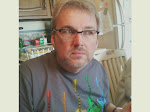Conversely, there are some things that you should not do when you are outside of the church. For example, everyone knows that prayer is much more effective (and holy) when it is offered in the church building. Sacred music is for the church and not the world. This is why churches have organs and choirs. Taverns, on the other hand, are equipped with guitars and public address systems.
Since becoming an adult, however, I have rejected my previously held beliefs about what is appropriate behavior, speech and dress for the church. I believe that there can be no distinctions between our lives in and out of the church. If I am a follower of Jesus, I must follow him all the time. This means that I should always be a Christian. It makes no difference where I am or who I am with.
So, let's consider what makes a pulpit? Where is it appropriate or effective to share your faith? Are there some places that are out of bounds?
The first answer is that the best place to share your faith is in a place where pre-Christians are. For many Christians this is a problem. Once we become a part of the Christian faith we join a church and cut ourselves off from the rest of the world. This should not be. Look for places where pre-Christians gather. Build relationships with those who are outside the faith. Invest your time and energy in the lives of others.
Once you have made a commitment to share your life with others, it is time to start using your new 'pulpits.'
- Shopping centers are excellent pulpits. Employees at your favorite store are ready to hear what you have to say about your faith. Be kind. Be friendly. Look for opportunities to naturally share your faith.
- Restaurants are potential pulpits. Your waiter/waitress is there to serve you, but you can make a difference in their lives by praying for them, being friendly, tipping generously and planting seeds.
- Your workplace can be a pulpit. Although there are often sticky political considerations in a workplace, often these are the people you know best. Learn to serve those you work with.
- Social and service groups can be pulpits. The people you spend your social time with are great candidates to share your faith with. Even if you never mention Jesus, you can have a profound influence simply by being a person of integrity.
- Family members are people who need to hear the gospel. Again, you must be very careful about offending those that you must live with, but you need to share the life-changing message with them nonetheless.
- Schools and school networks are places to share your faith. Students, faculty, staff, parents and community members can have a positive influence on their local schools and faith.
Here is a challenge, and it's a dangerous one. For the next week pray for opportunities to share your faith. Ask God to put you in places and conversations where you can make a difference for the Kingdom of God. Then, put that prayer into action. Look for times and events that will lend themselves to such conversations. You will be amazed at what happens. You will share your faith, and you will love it.


